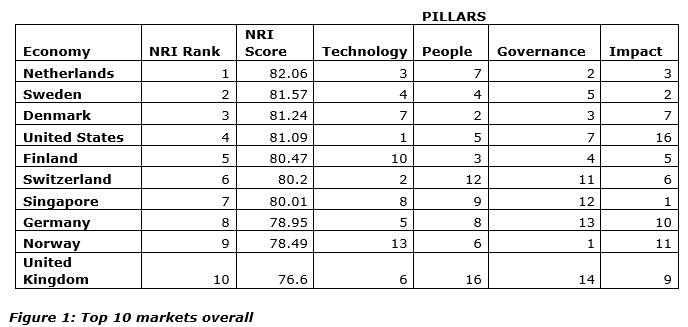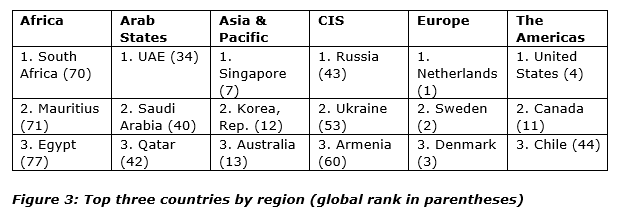
The latest results and rankings of the Network Readiness Index (NRI) were released by the Portulans Institute, revealing how countries around the world are leveraging information technologies to emerge from the COVID pandemic and become ‘network ready’.
This latest edition ranks a total of 130 global economies based on their performance across 60 variables.
The findings are included in a new report published today, ‘Shaping the Global Recovery: How digital technologies can help make the post-COVID world more equal’.
KEY TAKEAWAYS
Europe the most ‘network ready’
The Netherlands, Sweden and Denmark are named as the top three most ‘network ready’ societies. This makes Europe (with eight countries in the global top ten) the best performing global region on the Index.
US and China leading the way in tech
The US remains the global leader when it comes to technology; ranking in the top five in each of the Technology sub-pillars (Access, Content, Future Technologies). China, meanwhile, is a leading player in areas such as artificial intelligence, e-commerce and 5G, but only ranks #29 overall.
India is a rising star
Among the world’s largest economies, India was notable for rising places 21 places compared to last year’s ranking, rising to #67. This performance, beyond technical aspects, captures India’s digital network accessibility, including the affordability of mobile devices and tariffs in the country.
Pandemic sees Africa fall further behind
Africa continues to trail other regions, especially when it comes to access, affordability, and usage of ICTs. The pandemic has further amplified inequalities through recognizable social, economic and political changes, which became particularly evident in terms of vaccination and debt-financing.
“The COVID pandemic has been a global tipping point in the adoption of technology. It arrived at a time when many digital technologies had reached a degree of maturity, allowing them to be deployed on a large scale rapidly. This report measures the impact of this accelerated digital transformation on governments, businesses, and individuals.” Said Soumitra Dutta, co-founder and president, Portulans Institute.
“A strong recovery is now taking place in many parts of the world, and digitization will be one of its core drivers. However, several factors could derail the recovery train, including a lack of digital talents and skills, and a possible resurgence of the digital divide between rich and poor countries. Technology can help us avoid a ‘K-shaped recovery’, but this requires immediate and coordinated efforts in three key areas: infrastructure, education, and governance.” Bruno Lanvin, co-founder and director, Portulans Institute said.
“With the world migrating to digital faster than ever, networks are at the center of the world’s socio-economic development. This year’s NRI report reflects how countries have embraced digital transformation and lays out a roadmap for economies to accelerate their digital journeys. STL is excited to partner with the Portulans Institute for this initiative as we believe network readiness is the cornerstone for achieving global growth, while transforming billions of lives.” Said Ankit Agarwal, Managing Director, STL.
THE NRI 2021 RANKINGS
The NRI is organized around four key pillars: Technology, People, Governance, and Impact, with sub categories within each pillar, spanning 60 metrics overall.
Even though the top ten countries from the NRI 2021 remain the same as last year, there has been significant changes within the group. The Netherlands moved up three positions to take the number one spot from Sweden, which has held that position since 2019. The US is now ranked in the top five for the first time in the 2019-2021 period.
The top ten countries in NRI 2021 are all high-income economies. The US (#4) and Singapore (#7) are the only markets in the top ten outside of Europe.








